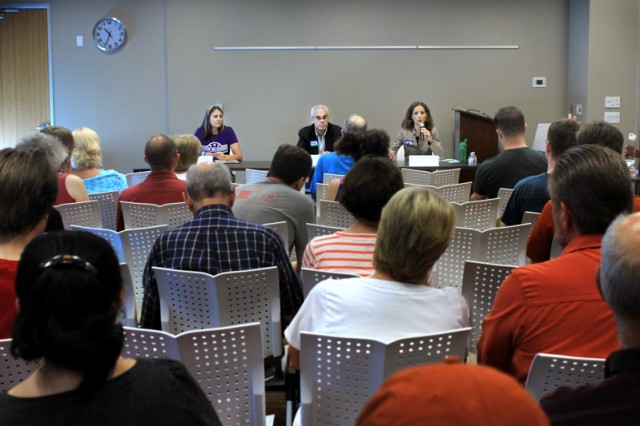Austin Council Race Could Hinge on Student Vote

UT Students and other residents of Austin’s District 9 attend a debate with the district’s City Council candidates Erin McGann (left), Chris Riley (center), and Kathy Tovo at the Southwest Educational Development Corporation on Oct . 18, 2014. Photo by Andie Rogers/Reporting Texas
By Alisa Semiens
For Reporting Texas
On a Monday night in mid-October, dozens of college students filled a conference room at the University of Texas to hear three Austin City Council candidates explain why they should get the students’ votes.
Incumbents Kathie Tovo and Chis Riley, and challenger Erin McGann shook hands and passed out campaign pamphlets before explaining where they stand on issues important to students, including transportation and rising rents in West Campus, an area filled with student apartment high-rises.
The Nov. 4 election is a historic event for Austin. The council is growing from six members to 10, plus the mayor. City Council members will be chosen by geographic district instead of citywide. The three candidates at the forum are running to represent District 9, which includes UT-Austin and West Campus, as well as other parts of Central and close-in East Austin.
More than 42 percent of the people who live in District 9 are between 18 and 24, the highest concentration in Austin, according to a city profile of the district. That age group votes at a lower rate than any other, according to data from the U.S. Census and Ready by 21, an Austin nonprofit that works to increase young voter participation.
All three candidates said they’ve made efforts to reach out to young voters.
“I’ve spent a lot of my time in West Campus, and so has my staff and volunteers, just out on the streets, handling out literature, knocking on their doors, reaching out with phone calls and making sure that they know that they are able to vote here if they reside in Austin,” Tovo said in an interview.
Riley said he has been reaching out to college students.
“We have been coming to student organizations and meeting with student leaders and talking about housing options and transportation options,” he said. “I think it is very important to let students know that their voices are important, especially in the local and state elections.”
It’s not clear, though, that students will turn out in greater numbers in this council election.
“I do not plan to vote because I have not researched the candidates and I don’t think it’s fair to our government or in general if you vote and you do not know the causes that you are voting for,” said Cheralyn Salone, a fourth-year engineering student.
Some students said they think their peers care less about local elections than national races.
“I think college students don’t participate as much in local elections because they think local elections don’t mean as much as the national elections,” said Heather Dyer, a fourth-year journalism student.
Dyer said she planned to vote for Riley, citing “all of the work he’s doing to help students,” including concerns about a city plan to enforce noise limits at live, outdoor music events in West Campus. The plan, announced in October, includes tougher permit requirements and could shut down many student-sponsored events.
“It does not make sense to apply the exact same rules in a very rigid way and stifle the energy you would expect in the West Campus area,” Riley said at the forum.
McGann said she thought the ordinance is not being equally enforced. “That is what makes these things work,” she said, “and the ordinances that we have obviously are not working.”
All three candidates have identified Proposition 1 as important to students, but have different positions. The city bond proposal would pay for a $600 million light-rail line running along East Riverside Drive, where many UT students live, to Highland Mall, now an Austin Community College campus and office center.
McGann said at the forum she opposes the proposal, questioning the route and the cost. “This rail is not going to serve the majority or where people are going in Austin, and we can do better for less and faster using buses,” she said.
Riley and Tovo are supporters.
“It’s really clear that our traffic situation is getting worse, and we need to take more aggressive action in that regard,” Tovo said in a later interview. “High-capacity transportation is one way to move people around and faster and get more cars off the road.”
Candidates also addressed student concerns on affordable housing, including rent increases in West Campus. McGann said in an interview that the city should change its budgeting process to control costs and ease the property tax rate.
Yan Garcia, a third-year public relations student, said in an interview that the candidates’ efforts to reach out to students have been noticeable.
“I think they have been doing a good job now in terms of going to large meetings for student government. They have been reaching out that way to students, and I think that is a really great way to connect to students on a more personal level,” she said.
One factor that could increase student turnout this year is that the City Council election was moved from May, the former date, to November, and coincides with elections for governor, lieutenant governor and other statewide offices.
Riley said he hopes college students turn out this time.
“We are hoping to see a whole new level of student engagement,” he said. “With having the election in November and having a district that is largely centered around areas where students live means there are so many reasons for students to get involved.”